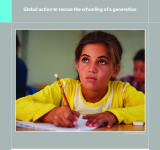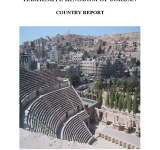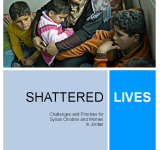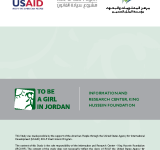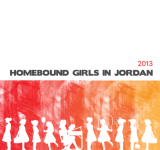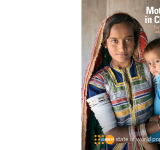The report assesses the practical challenges of education and schooling for the Syrian children in refugee camps in Jordan;; Lebanon and Egypt as the Syrian Crisis prolongs. It argues that ensuring the continued access to learning is an essential platform for protection;; social stabilization and economic recovery that the international community should not ignore. The report also includes important figures and statistics revealing the alarming situation of education and school. Some of the key statistics are the host-country school-age children compared to Syrian school-age children;; Syrian children enrolled in public schools in Lebanon and Jordan and school-age Syrian refugee children in and out of school by countries such as Iraq;; Egypt;; Turkey;; Jordan and Lebanon. The report concludes with four key recommendations to be undertaken by regional governments and their international partners so that the fundamental right to quality education can be guaranteed to the Syrian children.
access
The report was published from the World Health Organization/ United Nations Children’s Fund (WHO/UNICEF)’s pilot project to test a method for the rapid assessment of the quality of drinking-water in six countries;; including Jordan;; China;; Ethiopia;; Nicaragua;; Nigeria and Tajikistan. This assessment report aims to develop a tool that would support WHO/UNICEF’s joint program in strengthening the monitoring efforts of the global access to safe drinking water. The analysis of the report is based on the water samples and statistical data that were collected from 1600 drinking water supply sites in 67 clusters. The report finds that drinking water quality is generally high in the distribution network of Jordan and national standards for bacteria complies with the WHO guideline values. It also identifies the sanitary risk factors for Jordanian water supplies including the presence of sewer lines;; old pipes and failure to properly maintain household storage tanks.
With an executive summary on the Syrian refugees situation in Jordan;; the report combines the conclusions of detailed assessments in various areas including as child protection and gender-based violence;; education;; water sanitation and hygiene;; and nutrition and health. It provides a holistic picture of the situation faced by Syrian children and women in Jordan to draw out recommendations for necessary plans of action. Some key findings of the report include growing challenges for water;; sanitation and hygiene situation in Za’atari camp;; several threats to the nutritional status and health of Syrian girls;; boys and women and increasing violence against adolescents. Bringing together the voices of children and women at the camps;; the report examines the situations of Syrian refugees in host communities and refugee camps and finds key recommendations based on them.
The UNICEF Syria Crisis is a series of bi-weekly report that provides a summary of the humanitarian situation in Syria and development of the organization’s projects in the regions including Syria;; Lebanon;; Jordan;; Iraq;; Turkey and Egypt. The report contains an overview to the changing situations and humanitarian needs of the crisis. It focuses on the results and progress of the UNICEF projects in partnership with other local agencies in each country. These projects aim to ensure sustained access to safe water and sanitation;; provide psychosocial support;; vaccination and school supplies for children and support camps and host community schools for increased school enrollment. Relevant figures that summarize and evaluate the development of ongoing programmes can also be found in the report.
In 2006;; the Sultanate of Oman undertook a project that aimed to support the implementation of the country’s vision towards conservation of biological diversity in the Sultanate of Oman. This report serves as an “evaluation and assessment of capacity building in the field of traditional knowledge related to biodiversity.” The report aims to describe the state of traditional knowledge on biodiversity in Oman;; assess capacity-building requirements in relation to traditional knowledge;; and provide a set of recommendations with a strategy for the protection and maintenance of traditional knowledge on biodiversity conservation. Various topics related to biodiversity are covered;; including irrigation;; tree cultivation;; crop improvement;; livestock management;; and soil and water conservation. The methodology used depends on three sources of information;; including a review of secondary data;; in-depth interviews;; and a participatory workshop.
دراسة بحثية وطنية تهدف غلى المستهمة في جمع بيانات دقيقة عن وضع الفتاة الطفلة وتهدف إلى تحليل الطريقة التي تؤثر فيها الثقافة المجتمعية التي يمارسها المجتمع على صياغة القانون. واستناداً إلى المواضيع التيي والثغرات التي أبرزها أصحاب العلاقة بناءاً على تحليل النتائج ومن خلال إتباع نهج يستند على حقوق الإنسان;; فقد تم تصنيف الدراسة إلى الموضوعات التالية: حقوق المساواة وعدم التمييز;; حقوق الأسرة;; وتعليم الفتاة والطفلة;; والعنف القائم على الجنس ضد الفتاة الطفلة;; وعمالة الفتاة الطفلة;; والصحة والزواج المبكر;; والعادات والتقاليد. والغرض من تحليل النتائج والتوصيات هو في انها ستسهم بفعالية في جهود كسب الدعم باسم الفتاة الطفلة في الأردن. واعتمد البحث على كل من منجية البحث النوعي والكمي;; حيث تم العمل على مراجعة التشريعات الأردنية والأطر الدولية ذات الصلة بحقوق الفتيات والأطفال;; إضافة إلى اجراء مقابلات مع خبراء قانونيين واجتماعيين وشخصيات عامة والمجتمع المحلي في الأردن حول القضايا ذا تالصلة بحقوق الفتيات والأطفال. وقد تم اعداد استبيان من اجل جمع المعلومات المطلوبة وتم تعبئته في كل من عمان والزرقاء وإربد والمفرق والعقبة والكرك. وكما قام فريق البحث بعقد سبع ورشات عمل للفنون على مستوى المملكة في 7 محافظات;; وعقد 4 جلسات مائدة مستديرة في 3 محافظات.
إن الهدف من التقرير هو التحقق من ظاهرة الفتيات جليسات المنازل في الأردن;; وهن الفتيات اللواتي انسحبن من المدرسة ويبلغن من العمر اقل من 18 سنة سواء كان الانسحاب رغبة منهن أو تم سحبهن من قبل عائلاتهم;; ويقضين أيامهن بالعمل في المنزل. ويهدف هذا التقرير إلى: أولاً فهم الأسباب إلتي أدت إلى حبس هؤلاء الفتيات;; ثانياً إلى تحديد التدخلات الممكنة التي تسمح للفتيات جليسات المنازل الوصول إلى التعليم وتساهم في تعزيز نموهم الاجتماعي. وتم تنفيذ البحث من خلال الاعتماد على منهجية البحث النوعي حيث تم اجراء مقابلات شخصية معمقة مع 46 فتاة جليسة منزل و40 والدة وذلك في أربعة مناطق في الأردن وهي: ماركا;; معان;; المفرق;; والزرقاء;; وكما تم العمل على مراجعة الأدبيات والتشريعات الموجودة والمتعلقة بحقوق الأطفال مع التركيز على قضية عمالة الأطفال.
يبرز تقرير حالة سكان العالم 2013;; الصادر عن صندوق الأمم المتحدة للسكان;; التحديات الرئيسية المتعلقة بحمل المراهقات وآثاره الخطيرة على تعليم الفتاة;; وصحتها;; وفرصها في العمل في الأجل الطويل. ويبين التقرير أيضا ما يمكن القيام به من أجل الحد من هذا الاتجاه وحماية حقوق الإنسان الخاصة بالفتيات ورفاهتهن.
